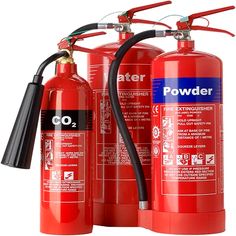No one likes to encounter fires. At the mention of fire! Everyone cringes. Sadly fire outbreaks happen all the time. There are several causes of fire, and there are several ways we can avoid fire outbreaks. However, this article is about fire extinguishers, which are one of the most common solutions to putting out a fire.
The purpose of Fire extinguishers
Fire doesn’t just happen. Fire requires fuel, heat, and oxygen to burn. This is why the fire extinguisher works to counter all of these requirements for burning. Fire extinguishers cool burning heat, make fuel less effective, and remove oxygen so the fire cannot continue to burn.
Usually, a portable fire extinguisher can effectively control a small fire. However, if the fire extinguisher is not applied by an individual properly trained to use it, there may be problems. Also, before you use a fire extinguisher, you must first be familiar with the type of fire each extinguisher is rated for and how it operates.
Classification of fires
Fires are in different forms depending on their severity. Fires can be:
Simple Fires
Often referred to as class A fires, these types involve ordinary combustible materials such as wood, cloth, paper, and plastics.
Flammable liquids Fires
These types of fires involve more elaborate and combustible fires. It also involves flammable liquids such as gasoline, kerosene, and oils. These fires are also regarded as class B fires.
Energized electrical equipment fires
These fires are usually prevalent amidst electrical equipment and appliances, such as motors, computers, etc. These fires are called class C fires.
Combustible metals fires
These fires usually involve combustible metals such as sodium, lithium, titanium, and magnesium. They are also called class D fires.
Some real-life losses as a result of no fire extinguisher
Here are some real-life fire incidents that occurred in Nigeria within the last few years. There were no fire extinguishers or any other means to put out these fires at the time they occurred.
- A bus explosion at Lanlate in the Ibarapa area of Oyo state in 2020 caused the deaths of over 20 people.
- Fire tanker explosion at Matogun Ogun state causing loss of lives and properties
- Over 100 were killed at a Nigerian illegal oil refinery blast on the 23rd of April 2022
- Twenty-five people, including children, were killed in an explosion and fire at another illegal refinery in Rivers State in October 2021.
- Over 700 fire incidents occurred in Kaduna in 2021, and 30 people were killed.
- An inverter battery caught fire in the finance ministry in Nigeria in February 2022.
7 Amazing Things about Fire Extinguishers

Here are seven amazing things, everyone needs to know about Fire extinguishers.
- There are eight different types of fire extinguishers.
You may have imagined that all fire extinguishers are the same. There are eight different types of fire extinguishers. Some fire extinguishers are less well-known because they’re usually used for highly specialized applications.
The eight types of fire extinguishers are:
- water
- foam
- Carbon Dioxide
- dry chemical
- Purple K dry chemical
- multi-purpose dry chemical,
- dry powder and
- Wet chemical extinguishers
Each fire extinguisher has symbols indicating which class of fire (A, B, C, D, K) they’re designed to extinguish. Failure to correctly match the type of fire extinguisher with the right fire class can worsen the fire. You need the training to identify which fire extinguisher will work for a type of fire.
- Fire extinguishers should be kept in open places.
Ideally, fire extinguishers are meant to be kept in open places and should not be hidden. This is because they’re usually used in emergencies. If they’re kept hidden, they may not fulfill their purpose.
- An expired extinguisher is useless and will not work.
One of the many mistakes people make is failing to check their fire extinguishers often to ensure their functionality. If a fire extinguisher is left for too long and unused, it can expire. An expired fire extinguisher is of no use to anyone. It will not work for intended purposes when you rush to use it during an emergency.
How to Check Your Fire Extinguisher
Checking your fire extinguisher requires a simple process:
- Check the fire extinguisher’s production and expiry date.
- Check the different parts of the fire extinguisher.
- Check that the fire extinguisher is not damaged. Check the seal on the extinguisher has not been broken and that the pin is still in position.
- Check the fire extinguisher’s nozzle to be sure it is clear, intact, and free from damage.
- Fire extinguishers must be recharged after every use.
Even if the fire extinguisher was accidentally discharged, it must be topped up anytime a fire extinguisher loses some of its extinguishing agents.
No matter how seemingly trivial this seems at the time, topping up can save lives, so make it your priority to act promptly.
- Fire extinguishers don’t last forever.
Fire extinguishers don’t last forever. It is usually good to get them replaced as required.
Usually, a well-maintained fire extinguisher can last for up to 12 years. If there’s no visible expiration date on your fire extinguisher, damage, rust, corrosion, and date last serviced are indicators that the fire extinguisher should be replaced.
Also, if your fire extinguisher is either water, powder, or foam, they are usually due five years after they’re first made. For a CO2 extinguisher, this will be due after ten years.
- A fire extinguisher must be large enough to put out a spreading fire.
Asides from it being readily available, fully functional, and charged, the size of a fire extinguisher matters. The size of a fire extinguisher is directly proportional to the amount of extinguishing agent it holds. The largest extinguishers will come with built-in wheels to make it easy to transport.
- Fire extinguishers aren’t the only tools you should have when fighting a blaze.
Asides from fire extinguishers, to save yourself from loss and harm during a fire, have a Sprinkler system in the ceiling, smoke detectors, fire monitoring, and other aids. These can help ensure that any fire emergency receives rapid and skilled attention.
Indeed, you shouldn’t go about expecting a fire or expecting the worst to happen to you. However, accidents often happen. And these accidents do not come with a notice. Always ensure that you put in adequate precautions and safety measures around your home. If you don’t already have one, get a fire extinguisher placed on standby in your home, office, or places of worship.

